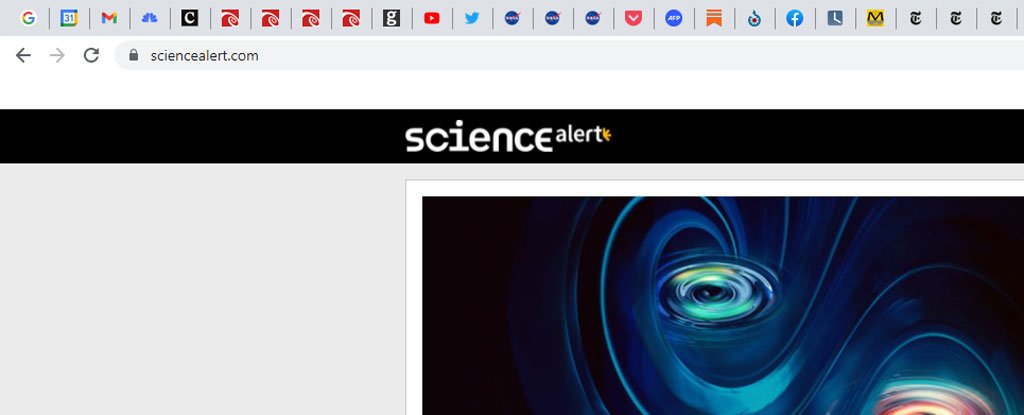Products You May Like
If you’re struggling to handle the long line of tabs open in your browser right now, you’re not alone.
A small new study has found many people who browse the internet experience tab overload, saving articles to read later, leaving tasks as reminders, or burrowing down an internet hole until the stack of open web pages becomes impossible to navigate.
The clutter can make people feel stressed, distracted, shamed, and overwhelmed. Despite this, we often avoid clearing up the mess.
In surveys and interviews with 103 participants, researchers found more than half the group felt like they could not close any of their tabs. If they did, participants worried they might lose important information, which took time and effort to gather in the first place.
For 30 percent of participants, the problem was so bad, they said they had a tab hoarding problem.
“Given that tabs are now ubiquitous to nearly all Web browsing, these numbers potentially translate to very large segments of the general population,” the authors write.
The findings match a similar survey from Japan in 2019, which found more than half the respondents considered tab clutter a problem.
The new research was designed to figure out what people were struggling with specifically so a solution might be found.
In general, the authors say, the issue boils down to two opposing forces.
On one side, you have those who feel pressured to close their tabs, possibly to help themselves focus or to stop their battery from draining.
On the other side, you have those who feel pressured to keep their tabs open because they might lose reminders of unfinished tasks or have to hunt down information and organize it again.
“People feared that as soon as something went out of sight, it was gone,” says Aniket Kittur, who studies human cognition at Carnegie Mellon University.
“Fear of this black hole effect was so strong that it compelled people to keep tabs open even as the number became unmanageable.”
In interviews, one participant equated their fear of closing tabs to a fear of missing out.
“It’s the fear of missing something important or something that will lead to enlightenment, to more knowledge, or something that will help you get a job,” they wrote.
Interestingly, this fear appears to be the overarching reason for most peoples’ tab clutter. Only 19 percent of participants said their inability to close tabs had anything to do with laziness.
One volunteer who did fall into this category likened their use of tabs to a growing pile of clothes in their room.
“Because if it’s a sweater that I wear a few times a week, it’ll be easier if I just get that sweater that’s draped over this chair than if I put it in my closet. But then that becomes, like, 30 things draped over the chair, and I actually can’t find anything draped over the chair,” they explained.
“I know it doesn’t make sense but I still do it. Like, in the moment, it seems like the right thing to do, the easier thing to do.”
But it doesn’t make things easier in the end. The mental burden of keeping tabs open and letting them pile up can also take a toll on productivity.
In the current research, 28 percent of participants said they struggled to find the tabs they needed in the clutter. A quarter said their computers had actually crashed because they had so many tabs open.
“When I can’t see the little icon,” said one participant. “Then that’s too many… I can otherwise definitely find what I want with like 3 clicks at most, generally 1 click.”
Browser tabs have existed in some form since the late 1990s, and the technology has changed very little since. Today, the method is ubiquitous across browsers, but this way of storing information is not keeping up with the sheer amount of web pages we can now access.
For years now, people have been complaining about tab overload, but the problem has only been addressed recently.
Currently, there are a few browser extensions you can download to help organize your tabs, including one that Google is creating for Chrome, but the authors of the new study think we need better tools for keeping track of our tabs and tasks.
“Managing this sort of task is really one of the most important aspects of productivity in our lives,” Kittur said.
“And the number one tool that everyone uses for it is tabs, even though they don’t do a good job.”
Using data from these interviews and then using data collected from interviews with another seven people about tab overload solutions, the team has created an extension called Skeema. The extension, which is currently invite-only, uses machine learning to help users organize, prioritize, and switch between tabs.
When testing an early version of the extension, respondents reported feeling more focused and less stressed in their online tasks.
“As our online tasks become increasingly complex, new interfaces and interactions that can merge tab management and task management in a browser will become increasingly important,” says computer scientist Joseph Chee Chang at Carnegie Mellon University.
“After 20 years of little innovation, Skeema is a first step toward making tabs work better for users.”
The research was presented at the Association for Computing Machinery’s Conference on Human Factors in Computing Systems 2021.
